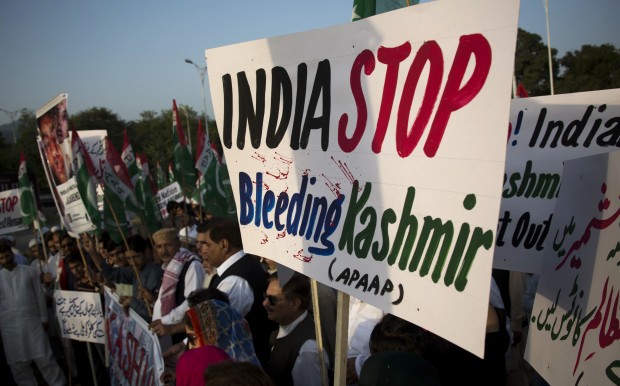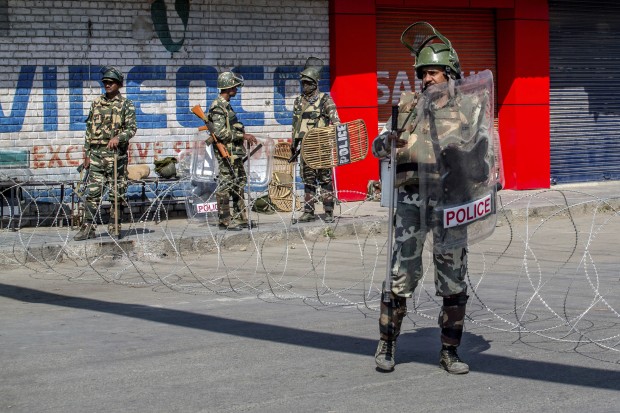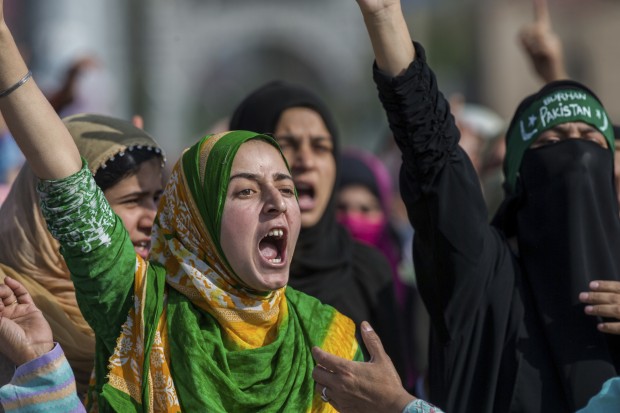The Unresolved Regional Problem of Asia: Kashmir

Pakistani protesters rally against India in Islamabad, Pakistan, Friday, Oct. 7, 2016. Pakistan’s parliament has adopted a resolution condemning India’s actions in the disputed region of Kashmir. (AP Photo/B.K. Bangash)
Kashmir is the northernmost geographical region of South Asia. Until the mid-19th century, the term “Kashmir” denoted only the valley between the Great Himalayas and the Pir Panjal mountain range.
The Kashmir conflict is a territorial conflict primarily between India and Pakistan, having started just after the partition of India in 1947. In August 1947, British India is partitioned into India and Pakistan as part of the independence process. China has at times played a minor role. India and Pakistan have fought three wars over Kashmir, including the Indo-Pakistani Wars of 1947 and 1965, as well as the Kargil War.
The root of conflict between the Kashmiri insurgents and the Indian government is tied to a dispute over local autonomy. Although thousands of people have died as a result of the turmoil in Kashmir, the conflict has become less deadly in recent years.
The Embassy of Pakistan has declared an Aide Memoire about this conflict:
History:
-Kashmir is a disputed territory between Pakistan and India, since India occupied it on 27th October, 1947.
-Kashmiri’s commemorate 27th October as the “Black Day”.
-India took the Kashmir dispute to the UN Security council on 1st January 1948.
-Security Council in its Resolution No. 91 passed on 30th March 1951 declared:
“…final disposition will be made according to the will of the people expressed through the democratic method of a free and impartial plebiscite conducted under the auspices of the U.N.”
-Kashmir has been a festering dispute for the last 70 years and the UN Security Council in its Resolution 1172 stated:
“(India and Pakistan are) urged to resume their dialogue on all outstanding issues, particularly on all matters pertaining to peace and security, in order to remove the tensions between them. They are encouraged to find mutually acceptable solutions that address the root causes of those tensions, including Kashmir”.

Indian paramilitary soldiers stands guard at an temporary checkpoint during curfew in Srinagar, Indian controlled Kashmir, Monday, Oct. 10, 2016. Authorities in Indian portion of Kashmiri imposed restrictions in some parts of Srinagar fearing religious processions marking the Muslim month of Muharram would turn into anti-India protests. (AP Photo/Dar Yasin)
-Kashmir’s legitimate right to self-determination cannot be denied and despite the countless Indian atrocities the people of the Kashmir are determined to claim their inalienable right to self-determination.
-Reputable international NGOs and human rights organizations have well documented the brutalities and inhuman treatment of Kashmiris by the Indian Army and Indian Security forces.
-Indian Army Para- Military Forces and Security Forces continue gross human rights violations with impunity and immunity under special ‘Black Laws’, such as: Jammu and Kashmir Public Safety Act 1978, Armed Forces (Jammu and Kashmir) Special Powers Act 1990, TADA, POTA, OSA etc.
-India does not allow any neutral observers, foreign journalists and fact finding commission of Human Rights Commission to visit Indian Occupied Kashmir.
-The UN Security General recently acknowledged that India even does not allow the United Nations’ Military Observer’s Group in India and Pakistan (UNMOGIP) representatives to visit their side of the Line of Control.
Recent Situation:
-Indian Occupation Forces killed Kashmiri Leader Burhan Wani on 8th
-Despite curfew restrictions, 200,000 people attended his funeral. Indian forces used indiscriminate force on the funeral procession, killing around 47 people with the instructions to ‘shoot to kill’. Overall, since 8th July, Indian forces have killed nearly 100 persons, injuring almost 15,000.
-With the use of pellet guns and excessive force, Indian forces have blinded 850 peaceful protestors, even damaging ambulances and harassing doctors where the injured were being taken for treatment.
-Strict curfew in the region since the death of Wani on 8th
-The Spokesperson for the UN Secretary General stated on behalf of the Secretary:
“The Secretary-General is closely following the recent clashes in Kashmir. He regrets the reported loss of dozens of lives and the injuries to many others and called on all the parties to exercise maximum restraint”.

Kashmiri Muslims women shout pro-freedom slogans during the funeral procession of Junaid Ahmed, a 12-year-old boy in Srinagar, Indian-controlled Kashmir, Saturday, Oct. 8, 2016. Indian forces fired shotgun pellets and tear gas Saturday as thousands carried the body of the boy killed overnight during an anti-India protest in the main city of Indian-controlled Kashmir. (AP Photo/Dar Yasin)
-A new generation of Kashmiris has risen spontaneously against India’s illegal occupation – demanding freedom from occupation.
-Burhan Wani, the young leader murdered by Indian Forces, has emerged as the symbol of the latest Kashmiri Intifada, a popular and peaceful freedom movement, led by Kashmiris, young and old, men and women, armed only with an undying faith in the legitimacy of their cause, and a hunger for freedom in their hearts.
-This indigenous uprising of the Kashmiris has been met, as usual, with brutal repression by India’s occupation force of over half a million soldiers.
-Pakistan has shared with the Secretary General of United Nations a dossier containing detailed information and evidence of the gross and systematic violations of Human Rights committed by Indian forces in the Occupied Jammu and Kashmir.
-These brutalities will not suppress the spirit of Kashmiris; it will only intensify their anger and fortify their determination to see India end its occupation of Kashmir. From Srinagar to Sopore, men, women and children come out each day, defying curfew, to demand freedom.
-Pakistan fully supports the demand of the Kashmiri people for self-determination, as promised to them by several Security Council resolutions. Their struggle is a legitimate one for liberation from alien occupation.
-International law and the declarations of United Nations on Self Determination, give the Kashmiri people the right to struggle for their freedom.
-Every year, the General Assembly unanimously adopts the resolution, which reaffirms “the right of all people’s to self-determination” and calls on the states concerned to immediately end their occupation and “all acts of repression”.
-The Prime Minister of Pakistan at the United Nations General Assembly 71st Session on 21st September has demanded the following:
1-An independent inquiry into the extra-judicial killings, and a UN fact finding mission to investigate brutalities perpetrated by the Indian occupying forces, so that those guilty of these atrocities are punishment.
2-The immediate release of all Kashmiri political prisoners.
An end to the curfew.
1-Freedom for the Kashmiris to demonstrate peacefully.
2-Urgent medical help for the injured and abrogation of India’s draconian ‘laws’.
3-Steps should be taken by the United Nations to de-militarize Jammu and Kashmir and undertake consultations with India, Pakistan and the true representatives of the Kashmiri people to implement the resolutions of the Security Council.
-The people of Kashmir have waited for 70 years for implementation of this promise. The Security Council must honour its commitments by implementing its own decisions.
-Pakistan welcomes the offer of good offices by Secretary General Ban Ki-moon.























































